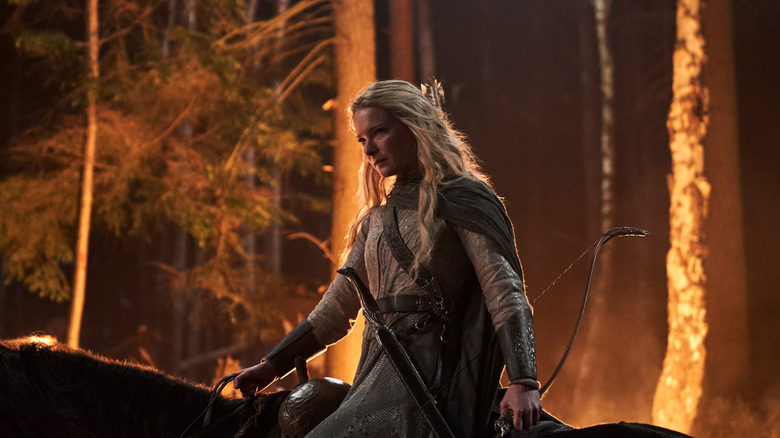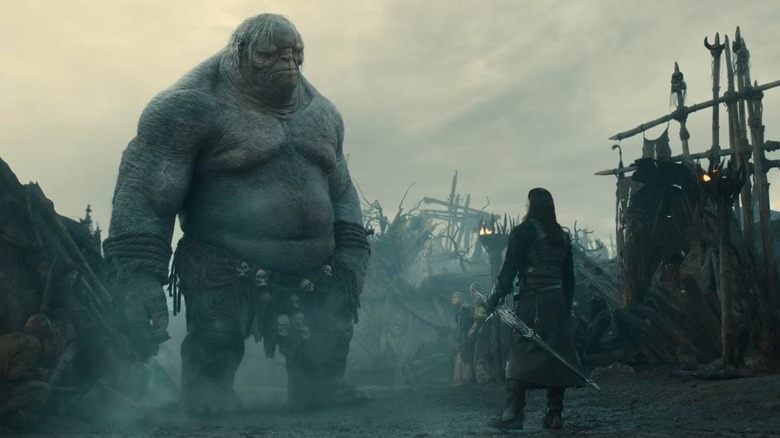The Rings Of Power Season 2 Rotten Tomatoes Tops Season 1 In One Major Way

Rotten Tomato scores may not say everything, but they can certainly tell you a lot. For better or worse (mostly worse), the entertainment rating site (which is all Roger Ebert’s fault) is seen as a status symbol for success and failure in modern cinema. You can use it to see which Christopher Nolan films are the best of the bunch or use it as proof that E.T. is still Spielberg’s best movie 40 years after its release. You can also use Rotten Tomatoes to compare an ongoing series from one season to the next. Case in point: Prime Video’s “The Lord of the Rings: The Rings of Power.”
Season 1 of that serialized Middle-earth blockbuster rolled out to decidedly mixed feelings from both the diehard and fair-weather elements of Tolkien fandom. Those opposed were so intense in their reactions that Amazon delayed reviews on its own streaming platform to combat trolls. In the end, Rotten Tomatoes reflected the polarization: Critics gave it an 83% Certified Fresh rating while the audience-driven Popcornmeter inverted the number, sitting at a messy 38%.
Now, season 2 has officially premiered, and three of its eight episodes dropped in a single release on opening night. This sizable sample of the season received a much warmer greeting from viewers. As of this writing, the audience score for season 2 stands at a respectable 67% (nearly a 30% rise from season 1). Even more impressive? The critic score has also bumped up nine percentage points to an eye-catching 92%. This is the real deal, folks. While audience scores are subject to unfair review-bombing from polarized TV viewers, the fact that essentially the same set of critics are back two years later to give this thing such a high rating shows showrunners JD Payne and Patrick McKay have managed to up the ante between seasons. Now, they just have to keep the score up throughout the rest of the season …and prepare for even higher heights for season 3.
Why is The Rings of Power season 2 better?
So, what is it that makes “The Rings of Power” season 2 better than the first batch of episodes? As you sift through the specifics of the critical feedback, a few themes emerge. For instance, one element isn’t so much about fixing as maintaining. Right from the jump, this show has been good in a few critical areas. It has gorgeous sets, stunning visuals, luxurious costumes, and a top-shelf musical score from Bear McCreary. Multiple critics point out that the quality in these areas stays strong in season 2, which is an important factor for growth with a show like this. It’s also by no means a guarantee, especially when you move the entire operation halfway across the world like they did when they left New Zealand to film season 2 in the UK.
Other critical analysis reveals season 2 is more confident and tells its meandering story as if it knows where it’s going this time. The mystery box elements are much fewer this time around, too, which is good since that pronounced element of season 1 rankled non-mystery-prone Tolkien fans to no end. (Tolkien just told us this stuff up front. Why can’t you?)
Other critics point out that as the story progresses, the narrative manages to delve deeper into some of its bigger themes while also giving some of the characters more breathing room to develop and allow the audience to emotionally invest themselves.
One comment from top critic Jack Seale from The Guardian (who gave the season a 4 out of 5 review) even backhandedly complimented the season-over-season progress by saying the Sauron storyline helps provide better drama in a show that is admittedly focused more on the lore side of the equation.
Is a 90+ score too good to be true?
While a 90+ score is great, one question is if it will last. Chances are we won’t see a huge swing in the rating unless something really goes sideways. Still, there are a couple of cracks in the foundation that are worth keeping an eye on. For one thing, the overall critic score may be 92% (again, as of this writing), but the Top Critic score, which features only the highest-rated critics on the site, is actually much lower, sitting at 72%. So, while the average critic may approve, those who really know their stuff are a bit more divided.
One issue that also came up repeatedly, even with positive reviews, is the pacing. The show was unwieldy in season 1, and season 2 has struggled to course correct. Yes, so far, it has focused on a few storylines more intensely, but it is also trying to introduce an endless string of new characters, from monsters like Shelob and the troll Damrod to new human characters like Estrid (Nia Towle), the entire nation of Rhûn, and the Dark Wizard it contains.
Even the positive reviews are also aware that we’re just two seasons into a five-season, pre-mapped-out story arc, too. This can preserve a sense of grace as viewers remember that this story is a long one, but it also tempers some reactions. For instance, Melanie McFarland, a top critic from Salon, said in her season 2 review that the show is “the rarest of affairs: one we can give ourselves over to entirely, reassured that it hasn’t let us down yet.” That “yet” looms large as we settle in to see if the rest of the season (and then the next three seasons) can maintain these initially lofty reactions, or if, at some point, it will come crashing back down to the polarizing depths of its predecessor.
Source link






